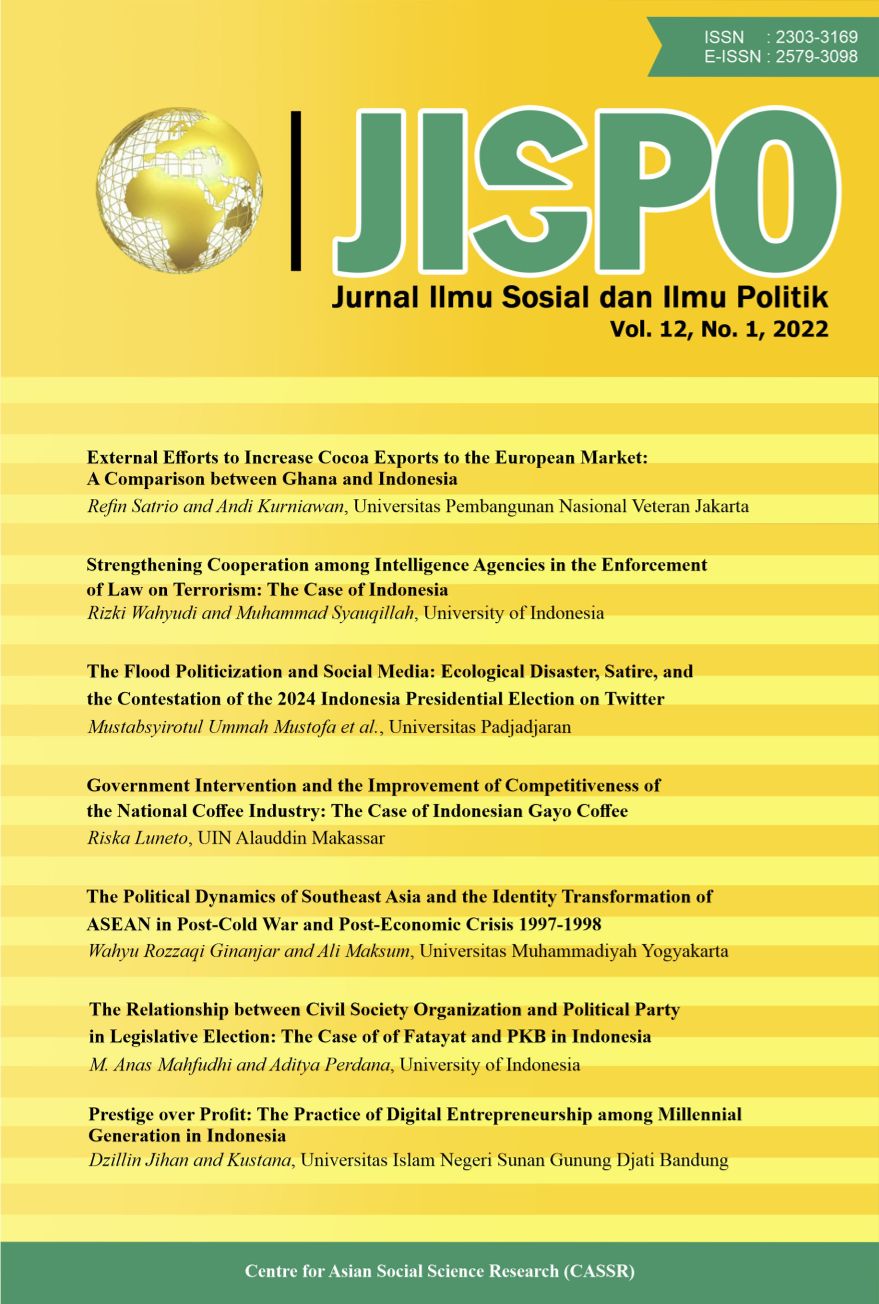Prestige over Profit: The Practice of Digital Entrepreneurship among Millennial Generation in Indonesia
DOI:
https://doi.org/10.15575/jispo.v12i1.17944Keywords:
The millennial generation, symbolic values, prestige, digital entrepreneurshipAbstract
Digital entrepreneurship has recently become a trend in cyberspace and it is often associated with the millennials who were previously said to be the least entrepreneurial generation. The millennials are digital natives who tend to follow a trend because of globalization which opens up unlimited public spaces. This article aims to examine the motives of the Indonesian millennial generation in doing digital entrepreneurship through qualitative research methods and Jean Baudrillard's post-modern theory approach. The required data were collected through interview and observation methods. This article argues that the main motive of Indonesian millennials in digital entrepreneurship is not profit-seeking, but rather prestige-seeking by following trends on social media so that digital entrepreneurship develops among millennials. The results of the study show that the tendency of being social media trend followers has encouraged Indonesian millennials to run digital entrepreneurship. The millennials tried to follow the trend of digital entrepreneurship to express their identities in the public sphere to create a good image of themselves. By doing so, they expected to be considered prestigious members of digital society with higher social status.
References
Badan Pusat Statistik. 2018. Statistik Gender Tematik: Profil Generasi Millennial Indonesia. Jakarta: Kementerian Pemberdayaan Perempuan dan Perlindungan Anak. Retrieved 12 May 2022 (https://www.kemenpppa.go.id/lib/uploads/list/9acde-buku-profil-generasi-milenia.pdf)
Burhanuddin. 2010. “Mendorong Pertumbuhan Ekonomi Melalui Peningkatan Jumlah Wirausaha: Sebuah Kerangka Penelitian.†Pp. 3-14 in Kewirausahaan dan Dayasaing Agribisnis, edited by Lukman M. Baga, Anna Fariyanti, dan Siti Jahroh. Bogor: IPB Press.
Deloitte Indonesia Perspectives. 2019. Generasi Millennial dalam Industri 4.0: Berkah Bagi Sumber Daya Manusia Indonesia Atau Ancaman. Jakarta: Deloitte Indonesia.
Elvinaro, Qintannajmia and Dede Syarif. 2021. “Generasi Millennial dan Moderasi Beragama: Promosi Moderasi Beragama oleh Peace Generation di Media Sosial.†JISPO: Jurnal Ilmu Sosial dan Ilmu Politik 11(2):195-218.
Erna, Wahyuningsih. 2019. “Model of Entrepreneurship Spirit in Millennial Generation.†Russian Journal of Agricultural and Socio-Economic Sciences 1(85):3-14.
Hendariningrum, Retno dan M. Edy Susilo. 2008. “Fashion dan Gaya Hidup: Identitas dan Komunikasi.†Jurnal Ilmu Komunikasi 6(2):25–32.
Hidayat, Medhy Aginta. 2019. “Menimbang Teori-Teori Sosial Postmodern: Sejarah, Pemikiran, Kritik, dan Masa Depan Postmodernisme.†Journal of Urban Sociology 2(1):42-64.
Idat, Dhani Gunawan. 2019. “Memanfaatkan Era Ekonomi Digital untuk Memperkuat Ketahanan Nasional.†Jurnal Kajian Lemhannas RI 7(2):5-11.
Mahyuddin. 2017. “Social Climber dan Budaya Pamer: Paradoks Gaya Hidup Masyarakat Kontemporer.†Jurnal Kajian Islam Interdisipliner 2(2):117-35.
Mardani, Akh. 2017. “Konsekuensi-Konsekuensi Modernitas: Perubahan Perilaku Konsumsi dan Kontestasi Tanda di Dunia Maya.†Thesis. Universitas Airlangga, Surabaya.
Moleong, Lexy J. 2017. Metodologi Penelitian Kualitatif. Bandung: Remaja Rosdakarya.
Muannas. 2018. “Proses Gatekeeping Terkait Redistribusi Konten Media Sosial: Perspektif Generasi Z.†Jurnalisa 4(2):256–70.
Nasdian, Fredian Tonny, ed. 2015. Sosiologi Umum. Jakarta: Yayasan Pustaka Obor Indonesia.
Pricila, Anggena, Maria Ulfah, dan M. Basri. 2013. “Pengaruh Pergaulan Teman Sebaya Terhadap Rasionalitas Ekonomi Mahasiswa Pendidikan Ekonomi FKIP Untan.†Jurnal Pendidikan Dan Pembelajaran Khatulistiwa 2(3): 1-12.
Purwanti, Silviana. 2013. “Korea, Remaha, dan Proses Peniruan.†Jurnal Psikostudia Universitas Mulawarman 2(1):28-36.
Putra, I. Kadek Jayendra Dwi dan Ni Ketut Pande Sarjani. 2022. “Fenomena Latah Sosial dalam Pembuatan Konten Visual di Era Industri Kreatif Digital.†Amarasi: Jurnal Desain Komunikasi Visual 3(1):9–15.
Putra, Yanuar Surya. 2016. “Theoritical Review: Teori Perbedaan Generasi.†Among Makarti 9(18):123–34.
Putri, Kenanga Tri. 2020. “Pengaruh Budaya Follower, Life Style, dan Prestise Terhadap Minat Beli Konsumen di Era Revolusi Industri 4.0 dalam Perspektif Ekonomi Islam.†Retrieved 15 May 2022 (http://repository.radenintan.ac.id/12079/).
Rahmawan, Alfin. 2021. “Hipperreality: Masyarakat Siber, Gadget dan Alienasi.†Retrieved 15 May 2022 (https://www.researchgate.net/publication/348149891_Hipperreality_Masyarakat_Siber_Gadget_dan_Alienasi).
Ritzer, George. 2012. Teori Sosiologi: Dari Sosiologi Klasik Sampai Perkembangan Terakhir Postmodern. Yogyakarta: Pustaka Pelajar.
Stein, Joel. 2013. “Millennials: The Me Me Me Generation.†Time Magazine, 1-9.
Steinhoff, Manfred. 1980. “Prestige and Profit: The Development of Entrepreneurial Abilities in Taiwanâ€. Monograph 20. Canberra: Development Studies Centre, The Australian National University.
Struckell, Elisabeth M. 2019. “Millennials: A Generation of Un-Entrepreneurs.†Journal of Business Diversity 19(2):156-68.
Subawa, Nyoman Sri dan Ni Wayan Widhiasthini. 2018. “Transformasi Perilaku Konsumen Era Revolusi Industri 4.0.†Pp. 131-39 in Conference on Management and Behavioural Studies.
Tarde, Gabriel. 1903. The Law of Imitation, edited by E. C. Parsons. New York: The Mershon Company Press.
Thompson, Derek. 2016. “The Myth of the Millennial Entrepreneur.†The Atlantic.
Yusoff, Wan Fauziah Wan dan Tan Shen Kian. 2013. “Generation Differences in Work Motivation: From Developing Country Perspective.†International Journal of Economy, Management and Social Sciences 2(4):97-103.
Downloads
Published
How to Cite
Issue
Section
Citation Check
License
Authors who publish their manuscripts in JISPO agree to the following terms:
- Authors retain copyright and grant the journal right of first publication with the work simultaneously licensed under a Creative Commons Attribution-ShareAlike 4.0 International License that allows others to share the work with an acknowledgment of the work's authorship and initial publication in this journal;
- Authors are able to enter into separate, additional contractual arrangements for the non-exclusive distribution of the journal's published version of the work (e.g., post it to an institutional repository or publish it in a book), with an acknowledgment of its initial publication in this journal; and
- Authors are permitted and encouraged to post their work online (e.g., in institutional repositories or on their websites) after publication process, or prior to and during the submission process, as it can lead to productive exchanges, as well as earlier and greater citation of published work (See The Effect of Open Access).




.jpg)



